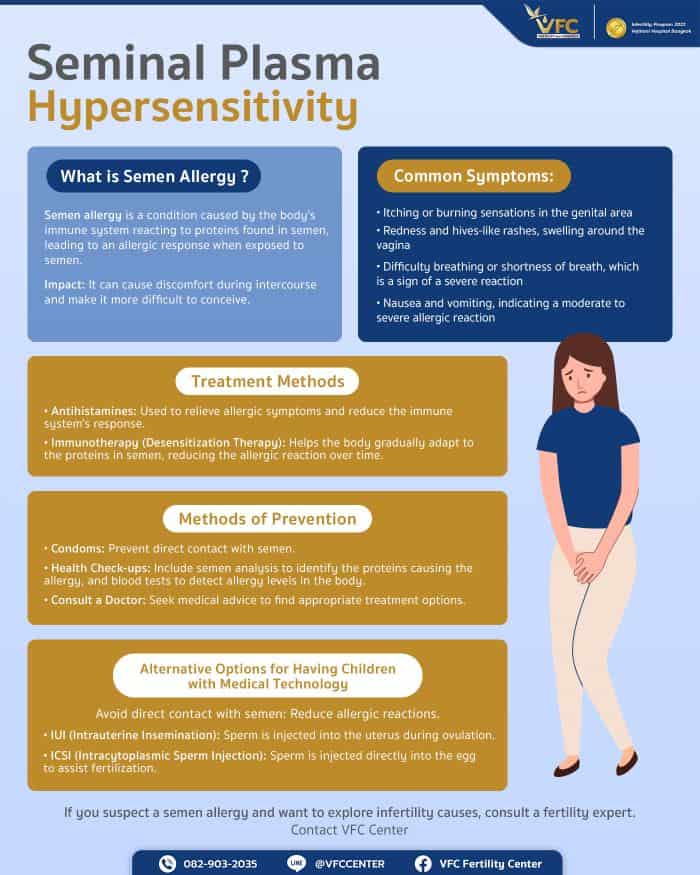
Semen allergy is a condition that many people may not be aware of, but it can significantly impact sexual intercourse and lead to difficulties with natural conception. Understanding the symptoms, causes, and treatment options for semen allergy is essential, as it helps couples plan their pregnancy more effectively and safely. By being aware of this condition, couples can take the necessary steps to address the issue and increase their chances of successful conception.

What Causes Semen Allergy?
Semen allergy, or medically known as “Seminal Plasma Hypersensitivity,” is a condition that occurs when the body’s immune system reacts to proteins found in semen. When the body is exposed to semen from the male partner, the immune system treats the proteins in the semen as foreign substances, triggering an allergic reaction. This can lead to discomfort during intercourse and cause difficulties with conception.
Symptoms of Semen Allergy
Semen allergy can present in various forms, either in the area of direct contact or affecting the entire body. These symptoms often occur shortly after sexual intercourse and include:
- Itching or Burning Sensation in the Genital Area: This is the most common symptom, appearing within minutes of contact with semen, and may last for several hours.
- A Red Rash Similar to Hives or Swelling in the Genital Area or Around the Vagina: This condition can spread to nearby areas as well.
- Irritation, Burning, or Inflammation Inside the Vagina: This causes discomfort and may interfere with daily activities.
- Shortness of Breath, Wheezing, or Difficulty Breathing After Intercourse: These are signs of a severe allergic reaction and require immediate medical attention.
- Nausea and Vomiting After Intercourse: These symptoms can occur in cases of moderate to severe allergic reactions.
How to Treat Semen Allergy?
For those experiencing semen allergy, doctors typically recommend antihistamines to alleviate allergic reactions. In some cases, immunotherapy (Desensitization Therapy) may be advised. This treatment involves gradually exposing the body to small amounts of the proteins in semen to help the immune system adapt and reduce the allergic response over time.

How to Prevent Semen Allergy Symptoms
Preventing semen allergy can be achieved through these methods:
Use of Condoms
Using condoms is an effective way to prevent semen from directly contacting the vaginal mucous membrane, thus reducing the risk of allergic reactions. However, it may not be suitable for couples planning to conceive, as it may require additional treatment methods.
Regular Health Check-ups
Regular health check-ups are essential, especially if you suspect that you have semen allergy symptoms. A doctor may recommend semen analysis for the male partner to identify the proteins causing the allergy, as well as a blood test for the female partner to measure allergy levels. Accurate diagnosis helps identify any abnormalities and enables the doctor to plan the appropriate treatment.
Consult a Doctor
If you have symptoms of semen allergy, it is important to consult an allergy specialist or obstetrician to seek advice on medication or other appropriate treatments.
Ways to Increase Pregnancy Chances for Those with Semen Allergy
For couples who want to have children but the female partner experiences semen allergy, doctors may recommend using medical technologies to help increase the chances of pregnancy. These options include:
IUI (Intrauterine Insemination)
IUI, or intrauterine insemination, is another option for couples facing semen allergy. In this procedure, the doctor prepares the male partner’s semen in the laboratory to select the healthiest and highest quality sperm, separating the proteins in the semen that may cause the allergic reaction. The sperm is then directly injected into the female partner’s uterus during ovulation. This procedure avoids direct contact with the vagina and reduces allergic reactions.
ICSI (Intracytoplasmic Sperm Injection)
In the ICSI process, the doctor collects eggs from the female partner and sperm from the male partner. The healthiest sperm is selected, and a single sperm is injected directly into the best-quality egg. The resulting embryo is then transferred back into the female partner’s uterus. This method ensures fertilization occurs without the need for sperm to come into contact with the vagina.
For those who suspect they have semen allergy and wish to increase their chances of pregnancy, or those who want to check for infertility causes, VFC Center (V Fertility Center), a leading ICSI clinic in Bangkok, offers consultations and provides tailored treatment options to help you achieve your parenthood goals.
Article by Dr. WORAWAT SIRIPOON
Contact or Book a Consultation:
VFC Center – V-Fertility Center
Hotline: 082-903-2035
LINE Official: @vfccenter

OBSTETRICS AND GYNAECOLOGY-REPRODUCTIVE MEDICINE





No Comments
Sorry, the comment form is closed at this time.